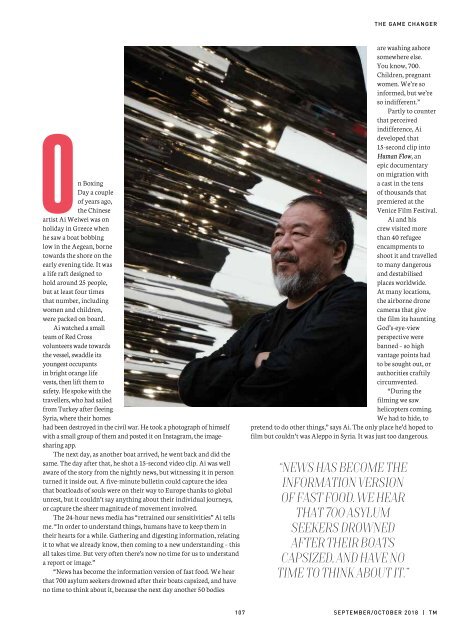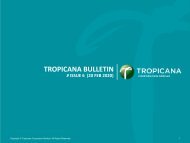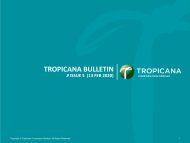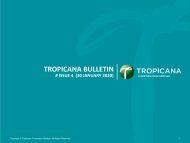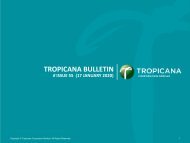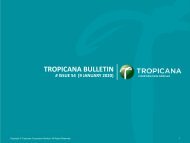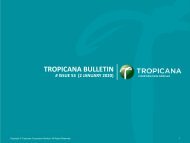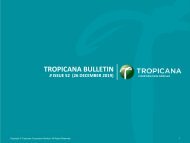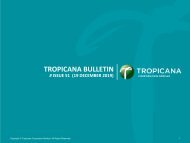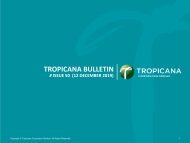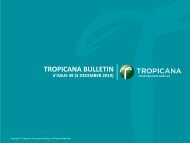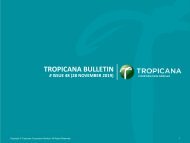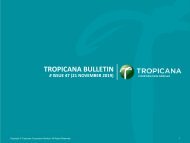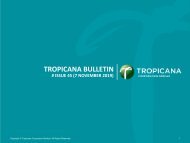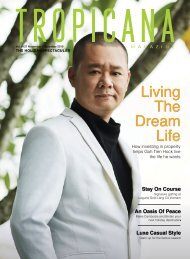Tropicana Magazine Sep-Oct 2018 #120: Art As Life
Tropicana Magazine's ART AS LIFE issue features Ai Wei Wei as the Game Changer activist of the Arts, MD of Simmons SouthEastAsia Mr Casey Teh talks about Somnology - the science of sleep; Check out our curated lists for you end of year travel plans
Tropicana Magazine's ART AS LIFE issue features Ai Wei Wei as the Game Changer activist of the Arts, MD of Simmons SouthEastAsia Mr Casey Teh talks about Somnology - the science of sleep; Check out our curated lists for you end of year travel plans
Create successful ePaper yourself
Turn your PDF publications into a flip-book with our unique Google optimized e-Paper software.
THE GAME CHANGER<br />
On Boxing<br />
Day a couple<br />
of years ago,<br />
the Chinese<br />
artist Ai Weiwei was on<br />
holiday in Greece when<br />
he saw a boat bobbing<br />
low in the Aegean, borne<br />
towards the shore on the<br />
early evening tide. It was<br />
a life raft designed to<br />
hold around 25 people,<br />
but at least four times<br />
that number, including<br />
women and children,<br />
were packed on board.<br />
Ai watched a small<br />
team of Red Cross<br />
volunteers wade towards<br />
the vessel, swaddle its<br />
youngest occupants<br />
in bright orange life<br />
vests, then lift them to<br />
safety. He spoke with the<br />
travellers, who had sailed<br />
from Turkey after fleeing<br />
Syria, where their homes<br />
had been destroyed in the civil war. He took a photograph of himself<br />
with a small group of them and posted it on Instagram, the imagesharing<br />
app.<br />
The next day, as another boat arrived, he went back and did the<br />
same. The day after that, he shot a 15-second video clip. Ai was well<br />
aware of the story from the nightly news, but witnessing it in person<br />
turned it inside out. A five-minute bulletin could capture the idea<br />
that boatloads of souls were on their way to Europe thanks to global<br />
unrest, but it couldn’t say anything about their individual journeys,<br />
or capture the sheer magnitude of movement involved.<br />
The 24-hour news media has “ retrained our sensitivities” Ai tells<br />
me. “ In order to understand things, humans have to keep them in<br />
their hearts for a while. Gathering and digesting information, relating<br />
it to what we already know, then coming to a new understanding – this<br />
all takes time. But very often there’s now no time for us to understand<br />
a report or image.”<br />
“ News has become the information version of fast food. We hear<br />
that 700 asylum seekers drowned after their boats capsized, and have<br />
no time to think about it, because the next day another 50 bodies<br />
are washing ashore<br />
somewhere else.<br />
You know, 700.<br />
Children, pregnant<br />
women. We’re so<br />
informed, but we’re<br />
so indifferent.”<br />
Partly to counter<br />
that perceived<br />
indifference, Ai<br />
developed that<br />
15-second clip into<br />
Human Flow, an<br />
epic documentary<br />
on migration with<br />
a cast in the tens<br />
of thousands that<br />
premiered at the<br />
Venice Film Festival.<br />
Ai and his<br />
crew visited more<br />
than 40 refugee<br />
encampments to<br />
shoot it and travelled<br />
to many dangerous<br />
and destabilised<br />
places worldwide.<br />
At many locations,<br />
the airborne drone<br />
cameras that give<br />
the film its haunting<br />
God’s-eye-view<br />
perspective were<br />
banned – so high<br />
vantage points had<br />
to be sought out, or<br />
authorities craftily<br />
circumvented.<br />
“ During the<br />
filming we saw<br />
helicopters coming.<br />
We had to hide, to<br />
pretend to do other things,” says Ai. The only place he’d hoped to<br />
film but couldn’t was Aleppo in Syria. It was just too dangerous.<br />
“News has become the<br />
information version<br />
of fast food. We hear<br />
that 700 asylum<br />
seekers drowned<br />
after their boats<br />
capsized, and have no<br />
time to think about it.”<br />
107 SEPTEMBER/OCTOBER <strong>2018</strong> | TM


